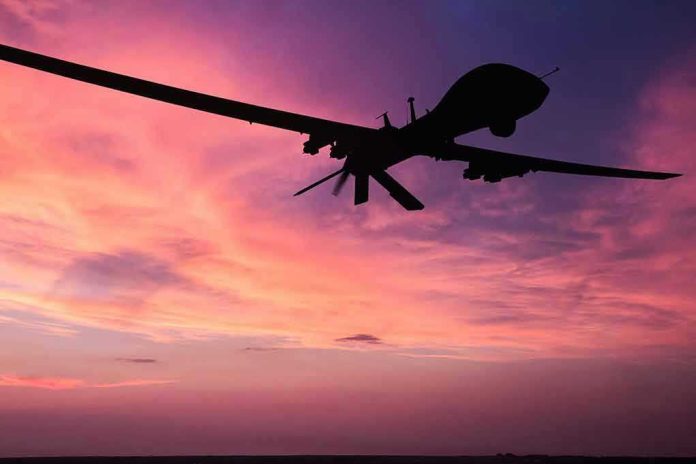
Poland’s military shot down Russian drones violating its airspace, marking the first time a NATO member has fired in defense since the Russia-Ukraine war began—a dramatic escalation with serious consequences for US allies and Western security.
Story Snapshot
- Poland downed at least eight Russian drones during a major Russian attack, invoking NATO Article 4 for alliance consultations.
- This marks the first direct military engagement by a NATO member in the Russia-Ukraine conflict, signaling heightened regional risk.
- Multiple Polish airports were closed and citizens ordered to shelter in place, reflecting the seriousness of the incursion.
- NATO forces, including Dutch F-35s, supported Poland’s air defense, demonstrating alliance unity against Russian aggression.
Poland Responds to Russian Drone Incursion with Force
On September 9, 2025, at least 19 Russian military drones entered Polish airspace amidst a widespread attack on western Ukraine. The Polish Air Force, supported by NATO Quick Reaction Alert aircraft, scrambled overnight to intercept the threat. By the next morning, Polish and NATO forces had shot down at least eight drones, closing major airports and ordering civilians to shelter in place. This decisive military response marked a historic first: Poland, as a NATO member, engaged in direct military action in the ongoing Russia-Ukraine war.
The Polish government swiftly labeled the drone incursion “an act of aggression” and formally requested NATO Article 4 consultations, a move used when a member feels its territorial integrity or security is threatened. Airports in Warsaw, Rzeszów, Lublin, and Modlin were closed during the incident, and one drone struck a residential building in Lublin Voivodeship, fortunately causing no casualties. The prompt invocation of NATO’s defense mechanisms and multinational support—such as Dutch F-35s joining the response—underscored the seriousness of the threat and the alliance’s readiness to defend member states against Russian escalation.
Escalation in NATO-Russia Tensions and Regional Stability Risks
This event represents a major escalation in the Russia-Ukraine conflict, directly involving NATO territory for the first time. Poland’s eastern border, adjacent to Ukraine and Belarus, has long been a strategic NATO frontier. Previous violations included missile debris incidents and near-border attacks, but never before had Polish or NATO forces fired in defense. Belarus’s role as a launchpad for Russian drones adds complexity, amplifying instability and heightening tensions between NATO and Russia. The incident triggered robust political pressure on alliance leaders to respond decisively, increasing military alertness along Poland’s border and raising public anxiety across the region.
Short-term effects included increased military readiness, temporary airport closures, and disruption for Polish civilians and air travelers. Longer-term implications may include further escalation of NATO-Russia tensions, changes in NATO air defense posture, and increased demand for advanced defense systems. The incident sets a precedent for alliance engagement in direct military defense, which could influence future policies and diplomatic relations. Social unease in border regions and economic disruptions from airport closures further highlight the broad impacts of such security threats.
Alliance Unity and Expert Perspectives on the Incident
Industry and security experts agree that Poland’s actions test NATO’s resolve and demonstrate alliance unity in the face of Russian intimidation. Analysts emphasize that the Article 4 consultations reflect a measured response, avoiding immediate escalation to Article 5—which would trigger collective defense. The multinational aspect, including Dutch Air Force participation, reassures member states of NATO’s readiness. However, experts caution that Russia may intend to probe the alliance’s defenses and unity, risking broader conflict. Polish officials stress sovereignty and deterrence, while NATO leaders highlight proportional response and solidarity. Russian and Belarusian sources deny intent to provoke, claiming the drones were targeting Ukraine instead.
Sources:
September 2025 Russian drone incursion into Poland – Wikipedia



